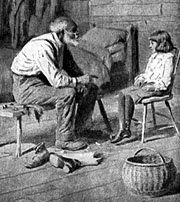 One has to wonder if the change from the pre-industrial age to the industrial age is everything that it is cracked up to be. Everything is faster and seems to grow faster each year. This may be a corollary to Moore's Law in the sense that as the technology grows ever more capable and faster, everyone using it imagines that they too have to participate in the rush to noise and chaos.
One has to wonder if the change from the pre-industrial age to the industrial age is everything that it is cracked up to be. Everything is faster and seems to grow faster each year. This may be a corollary to Moore's Law in the sense that as the technology grows ever more capable and faster, everyone using it imagines that they too have to participate in the rush to noise and chaos.Communication among the members of an organism, the individual parts, the cells of the body, the neurons of the brain, has a great deal to do with the capability of the organism. This seems no less true of the community of man then of the more unified life of an organism. Communication would appear, like some theoretical elements in Computer Science, to consist of the size of the message as measured in information content, and the speed of the transmission. Impeding effective communication is the presence of "noise." Noise is a aspect of the communication or the communication path that obscures or interferes with the conveyance of the information.
In the past human communication was limited by the voice of a man, the scribble of a pen and the speed of a horse. In some cases simple messages were sent by semaphore or by covering and uncovering fires, but that was relatively rare. The invention of the printing press and movable type increased communication by multiplying the number of copies of information that could be disseminated. This had a profound impact on literacy, since before printing a book, like the bible for example, was as expensive as a small villa. Many sheep sacrificed the ultimate price to provide the vellum and many scribes spend many hours painstakingly copying the text. Printing ended that.
The steam engine provided more speed. The railroad was known as the "Iron Horse" and was a good deal faster than a horse over the long haul. Then telegraph wired things up and messages could be sent in hours that had before taken days. In the mad rush of technology telephone followed, then radio, then television, now in the span of my own life. Then it was computers which could be connected to a network, and then cellular radio made it possible for every citizen to carry a small phone and be "linked in."
But what's the point? What's the information being passed that demands all this speed and bandwidth? There seems to be little point for what is happening is that the noise of irrelevancy and casual comment is swamping the bandwidth. The very speed of communication seems to marginalize the value of systematic and contemplative thought. A great word for it all might be "chatter." The chatter as captured in the marvelous name of the latest social networking phenomenon, Twitter, seems to have driven out what little thought was there. Now we can tweet and chatter and text, but we discover that most of the time we really don't have very much to say. Perhaps the time would be better spent in contemplation of how we got here and why, and whether it ultimately matters.








No comments:
Post a Comment